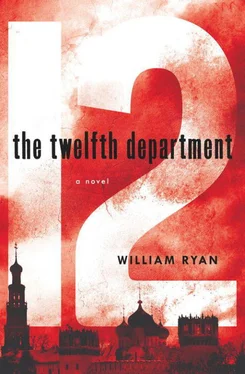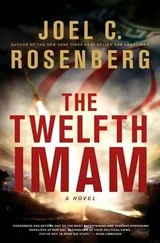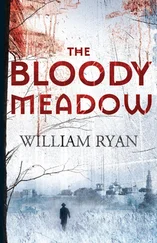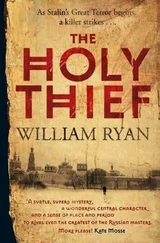“The storm has come at last,” he said. “Let’s hope it means the air will be cleaner—cooler too, with luck. I’m Shtange. The deputy director.”
“Korolev,” he said, still feeling the strength of Shtange’s grip, “but you know that.”
Korolev was surprised at how rough Shtange’s hands were—they didn’t feel like a doctor’s hands, far from it.
“Yes, they told us you’d be coming. I’ve been instructed to be as cooperative as possible.”
“Thank you.”
“We’re all shocked by the news, of course.”
For an instant Shtange was silhouetted against the window by lightning, which was followed almost immediately by a deafening blast of thunder—even closer now, it seemed. A real summer tempest, Korolev thought, not without some satisfaction.
“Professor Azarov was a tireless striver for Socialism, a Stakhanovite worker of the highest productivity. With more like him, the State would be completing Five Year Plans in two years not four.”
Shtange had to shout to be heard over the wind and rain lashing at the windows, but even so, his words sounded formulaic, almost as if he were embarrassed by what he was saying.
“We’ll investigate his death with every resource available to us, of course.”
“I don’t doubt it, Comrade Korolev, I don’t doubt it. Such an important figure in Soviet science—well, the State will expect nothing less.”
Shtange extracted a metal cigarette case from the pocket of his dark jacket, took one out and tapped it on the table. Korolev noticed with interest the engraved propeller design on the case’s lid—wondering to himself what Shtange’s connection with airplanes might be. Shtange caught the glance and, misreading his interest, offered Korolev a cigarette.
“I have my own,” Korolev said, embarrassed, and pulled his Belomorkanals from his pocket.
Shtange shrugged and closed the case with a snap. Korolev could see there was an inscription beneath the propeller, but it was illegible from this distance. Maybe he should have taken a cigarette after all.
“I presume Azarov’s death will have a serious affect on the institute’s work?” Korolev asked.
“We operate as a collective, Comrade Korolev, like all Soviet organizations. The institute bears Comrade Azarov’s name, of course, but whoever of our number falls away, there will always be another ready to step forward to replace them.”
“You, perhaps?” Korolev said, feeling his bait being taken. “I mean to say—will you be appointed the new director of the institute?”
“Comrade Korolev, if I’m appointed director it will be because someone higher up decides I should be—not because I ask for it. As it happens, I think they’ll find someone else. Unless I’m wrong, my remaining time here will be very short.”
He spoke with a certain satisfaction and Korolev had the impression the fellow wouldn’t miss the place at all.
“Anyway,” Shtange continued. “You’re here to investigate Comrade Azarov’s death—what can I do to assist?”
Korolev looked around him—it was a large room, overlooking the garden. The desk that Shtange sat behind was also large and on it two wooden trays sat either side of a wide leather-cornered blotter. The trays were marked “in” and “out”—the “in” tray was almost empty, whereas the “out” tray was piled high.
“You’ve been busy,” Korolev said.
“Not me, Comrade. The director attended to these papers himself this morning.”
“The director?” Korolev asked and then worked it out. “This is his office, then?”
Korolev let his eyes wander round the wooden paneling that covered the walls, the obligatory portraits of Stalin and Lenin, Marx and Engels, the filing cabinets ranked along one wall—but this time with a different eye. So this was where the dead man had worked. He turned his attention back to Shtange.
“You’ve moved in quickly.”
The deputy director laughed, a genuine laugh—rich and good-humored. It was unusual to come across such a laugh during a murder investigation.
“Look, Korolev—I’d nothing to do with Professor Azarov’s death, nothing whatsoever. I’ve been asked to take over in the short-term, at least until a decision is made as to the institute’s future—so here I sit. There are aspects of the institute’s work I simply don’t know about and this is the place to find out about them.”
“Of course, you serve Socialism in whichever capacity you’re asked to.”
Shtange raised an eyebrow but otherwise didn’t react.
Korolev, disappointed, let the conversation go silent. But it soon became clear that the silence didn’t bother Shtange at all. In fact the deputy director sat back in his chair and began to give every appearance of enjoying it.
“I’d like to look through this paperwork of his,” Korolev said, feeling a little irritated at the fellow’s calm reaction. “If that’s all right, of course?”
“I’m afraid you can’t,” Shtange said, leaning forward to stub out his cigarette.
“I can’t?”
“I’m afraid not. The professor’s work was, and remains, strictly confidential. If you’d like to get access to his correspondence or anything similar, you’ll have to ask permission from the organization that the Azarov Institute forms part of. And thirty minutes ago the responsible person at that organization informed me that such permission will be refused.”
Korolev had a fair idea what organization that might be—his encounter with the guards at the front gate should have made it clear to him that this visit was a waste of time. But he dutifully scratched his head and pretended to look puzzled.
“I’m sorry, Comrade Shtange, I don’t understand. You said you would be cooperating with the investigation.”
“Only as far as is possible. I think I was clear about that.”
“I see,” Korolev said, understanding all too well. “So you’ll be helpful to the extent you’re able to—which is not at all.”
“I wouldn’t put it that way—I can’t discuss the work carried out by the institute. Or the identities of any of my colleagues working here. Or any information of any sort concerning the institute. That’s all true.”
Shtange smiled.
“But then, even I don’t know everything that goes on here—it’s nothing to do with wanting to obstruct your investigation. Our research would lose its value if we went around telling everyone about it.”
Korolev found himself scratching his head again.
“So what can you tell me?” he asked.
“I can tell you that I met with the professor this morning—he came into the institute first thing. I wrote a report which he…” Shtange paused, seeming to consider his words carefully, “which he wanted to discuss.”
“He seemed normal, to you?”
“His normal self,” Shtange said, and Korolev wondered whether the careful way the answer was phrased was deliberate. Shtange smiled, as if acknowledging Korolev’s observation.
“How shall I put it, Comrade Korolev?” he continued. “The professor could be forceful and direct. We didn’t always see eye to eye—and certainly not on this matter.”
“I see—an argument?”
“You could call it that.”
“About your report?”
“Yes.”
“But you can’t tell me what was in the report.”
The deputy director gave him a wry smile.
“No. But I can tell you that the guards at the gate keep a record of everyone who enters and leaves and they can confirm I’ve been here since seven. I’m sure, if you ask them, they can also tell you precisely when the professor arrived and left this morning.”
“Will they be allowed to tell me though?”
“They will be. I requested it. I don’t want my time taken up by your investigation any more than it has to be. I thought you’d inevitably want to—how shall I put it?—ensure yourself of my innocence. I anticipated your frustration, Captain Korolev, and so, at my further request, I’m allowed to give you some assurances.”
Читать дальше












